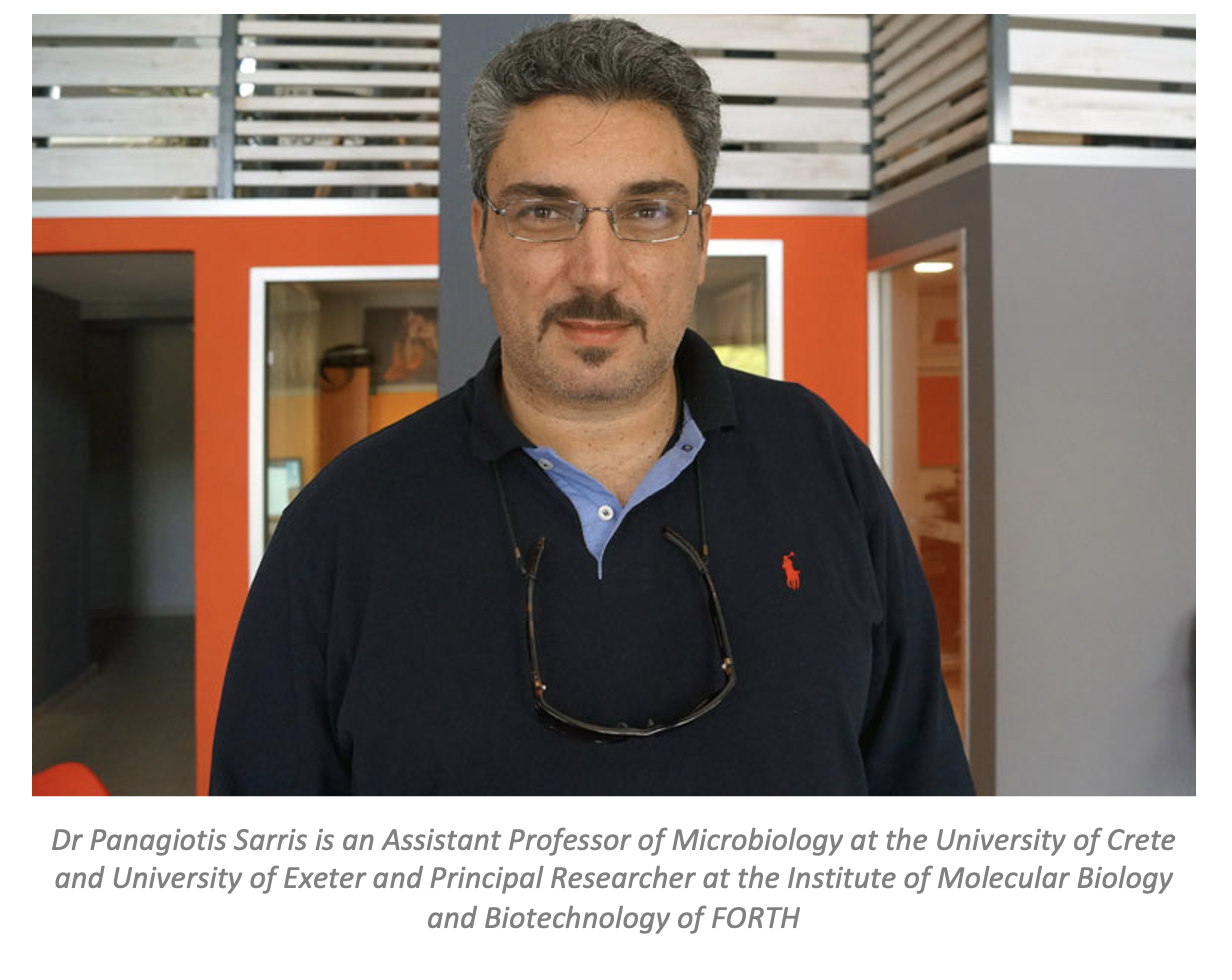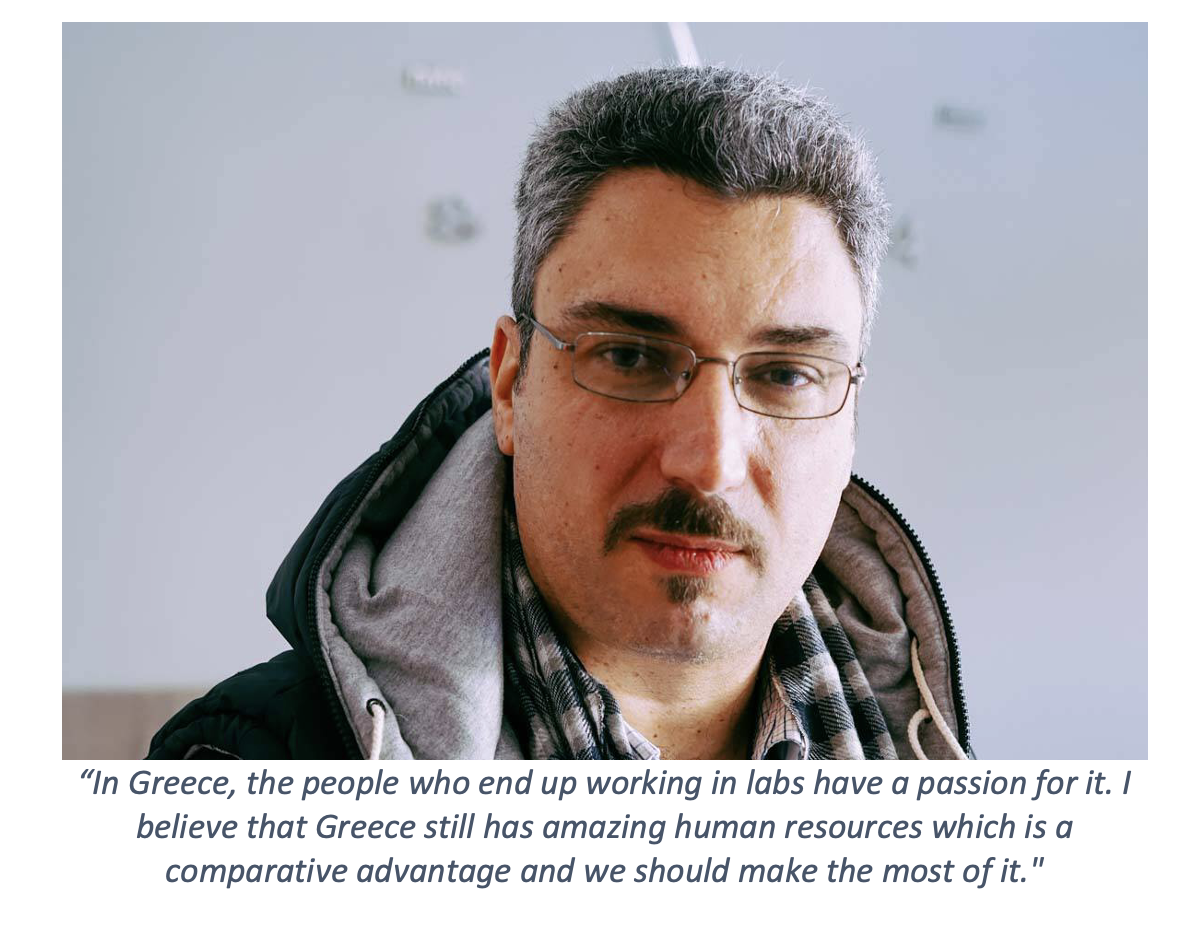Getting to know our PIs: Dr. Panagiotis Sarris
May 09, 2021, George Angelakis

At iGEM Crete we believe that in order to cultivate and maintain a balanced relationship between the scientific community and the world, it is necessary to strengthen the bridges of trust between us. We came to the conclusion that nothing could be more direct than talking to our Project Instructors about things outside the scope of a single lab and project and give you -through our conversation- the opportunity to get to know a little better the scientists who are leading the University of Crete’s team in the iGEM 2021 Competition.
What was it that attracted you to biology from the get-go and when did you decide that a career in research was what you wanted to pursue?
That’s an interesting question. From a very young age I loved to do research. First of all, I was a person who tried to investigate in depth anything that caught my fancy, but what really contributed to my decision to go into biology, strange as it may seem to you, was Jacques Yves Cousteau.
I am a child of the era when Jacques Yves Cousteau documentaries were at their peak and when I asked myself what I wanted to do with my life, the answer was almost spontaneous: I want to do something akin to what this gentleman is doing. After I did some research and saw that in order for him to become an oceanographer he first went through a “basic” science I asked myself which would be the one closest to what I wanted to do; and I realised that it was biology.
Of course when I was telling people, at the time that I was going to study biology, they thought I was going to be a school teacher. After all, this was before the decoding of the human genome and the great expansion of molecular biology from there on. So people didn't really know much about this science, especially in Greece. However, I was determined. Although they tried to change my mind several times they didn't succeed, so you could say that I am a biologist in my conscience and not a biologist who was sent by the system to biology because he didn't manage to get into a medical school or some other similar school.
You have spent a large part of your career in the UK at two very prestigious institutions, the University of East Anglia and the University of Exeter, where you are still an honorary associate professor. What would you say is the most important difference in the scientific approach to a problem between Greece and Great Britain, but also in general, how you think research is treated in Greece and the UK respectively.
The differences are significant in terms of the level of funding. In the UK, the funds that are spent on research are large and there is a constant flow. Every researcher knows that at least twice a year they will have the opportunity to submit research proposals to be judged for funding which are either based on some results they already have in the lab or completely novel proposals that came to them as an idea but seem to have merit and they need to substantiate it. This does not exist in Greece. There is no such regularity in the announcement of research programmes, which makes the situation much more difficult.
Another problem in Greece is that there is an incredible bureaucracy in terms of “the next step”, which is the management of research programmes. Once a programme has been approved you also have to manage it - and the level of bureaucracy is bottomless. There is no end to it. We (researchers) are getting to the point where we have to be both accountants and human resource managers as well as have many other qualities that take away valuable time from actually working on our subjects.

These are the two big differences I identify. But there are good things about Greece that I didn't encounter as much in the UK, such as the willingness of young people to get involved in science. In Greece, kids give me the impression - at least those who end up going into laboratories and doing research - that they have a passion for doing it. In Britain things were a little more “lukewarm” on this issue. So I think that Greece still has great human resources, which is a comparative advantage and we should make the most of it. Young people like science and they like research.
In physics, as I'm sure you know, the "next big thing" is finding a unifying theory. In other sciences we can find similar examples. In a science as multidimensional as biology do you think that synthetic biology could be one of the "next big things" ?
Obviously. The point is that synthetic biology is essentially a hub that connects many chains together where each chain is a separate branch of biology. This means that you can find applications of synthetic biology in biomedical research but you can also find applications in agricultural biology; in all fields of biology really. Synthetic biology can act as a catalyst for the evolution of things. Even though each field has its own big question to answer and sets its own future goals, synthetic biology could prove to be a useful tool for reaching our own respective goals.
So we're talking about a big platform so to speak. But you mentioned at some point about agricultural biology and I saw that in 2017-18 you had been a scientific advisor to the Greek government on the development of strategies for research in edible crops. I would like to ask if you think that as a country we are "behind" in research in this area and if you think that synthetic biology can play a role in such research.
I’d say yes. Probably with a combination of synthetic biology and molecular biology because in Greece - unfortunately I realised this when I came from Great Britain - there is an enclosure of certain research fields within which there are people with very specific studies. For example, it is not easy for a biologist to work in agrofood because there are specialties such as agronomy or animal husbandry which consider this research field their own for reasons that are inexplicable to me. Are we lagging behind? Funding is obviously inadequate in this field, although as a country we have comparative advantages in terms of research in agrofood and obviously in synthetic biology, which is a science that can make a major contribution to the development of this sector. There needs to be a development strategy in research so that we invest in areas where we have comparative advantages over other areas where we may have fewer.
One last question: in the last two years the Covid-19 pandemic has given a big boost to epidemiological research and also to research into vaccine production. Do you think that synthetic biology can contribute to this research, and if so, how?
Obviously it has already demonstrated this. The answer is obvious! If you think about the mRNA vaccine technology, which is purely the use of synthetic biology combined with the use of data from the field of micromaterials, obviously it has given a huge boost, but for me the most important thing is that it has been a great example to wake up people who are making decisions about funding in research. To show them that in any moment something can come up that we hadn't thought of and that we should be ready, at any time, for any challenge in the future.
Let’s assume that in the biomedical sector we have realised this a little bit. But what about the food sector? Are we ready to face the food crisis that is looming and meet the needs of a population that will reach ten billion people in 2050? So the crisis that we are going through at the moment shows us that we need to fund research, both the applied and basic one. Because in the end, many of the findings of basic research are the ones on which research for the development of vaccines, particularly mRNA vaccines, is currently based.
About our blog
Daily articles related to synthetic biology by our great team of iGEM Crete.